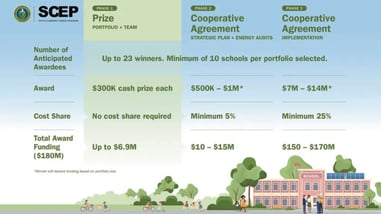 The U.S. Department of Energy opened applications Wednesday for the 2024 Renew America’s Schools prize, which will award $180 million in funds to school districts nationwide to implement energy upgrades.
The U.S. Department of Energy opened applications Wednesday for the 2024 Renew America’s Schools prize, which will award $180 million in funds to school districts nationwide to implement energy upgrades.
The prize, funded by the Biden Administration’s Infrastructure law, represents a significant opportunity for K-12 schools to improve infrastructure. Research has shown that improving school infrastructure through such activities as adding insulation reduces costs, improves student health, and contributes to better learning.
The Status of School Facilities
A 2021 American Society of Civil Engineers Infrastructure Report card rates the nation’s schools a D+ on efficiency. Further, a Government Accountability Office (GAO) study found that 41 percent of school districts need to update or replace heating, ventilation, and air conditioning (HVAC) systems. About 50 percent of schools visited by GAO had HVAC-related problems such as leakage floor and ceiling damage. Additionally, two systemic scientific reviews concluded that inadequate building ventilation is associated with the increased transmission of respiratory infections, including COVID-19 and other ailments.[1]
Eligible improvements for funding include HVAC, ventilation, building envelope, and lighting projects. Investments in renewable energy technologies that will improve energy performance or improve student, educator, and staff health can also be covered.
By reducing energy use, schools reduce operational costs, which are their second-highest expense. The money saved on operational costs can fund other necessary school programs like afterschool, summer learning, and other educational opportunities for students.
3E Plus Can Assist
One tool schools can use to calculate energy savings by conducting pipe insulation retrofit work is NAIMA’s 3E Plus pipe insulation thickness calculator. Using this free calculator and including just a few pieces of information, school facilities can calculate savings across various insulation thicknesses to estimate overall energy savings. One study found that schools, office buildings, apartments, and stand-alone retail buildings completing roof and HVAC pipe insulation upgrades results in whole-building energy savings of approximately 5 percent on average nationally. Nationwide, primary schools would save nearly 9 percent by incorporating these insulation improvements, while secondary schools would average energy savings of 7 percent.[2]
The Process
School proposals will implement energy assessments and building improvements across a portfolio of 10 or more school facilities. DOE requires that competitors submitting proposals should be organizations or teams with the capacity to aggregate and manage projects across a portfolio. During Phase I, competitors will build teams and develop lists of school facilities that demonstrate the need and eligibility for the investment.
Phase I winners will earn a prize of $300K and move on to the second and third phases, during which teams will enter and engage in a Cooperative Agreement with DOE. Awards in the second and third phases will vary but could range from $7.5 million to $15 million. DOE will grant the largest awards to portfolios serving 20 or more school facilities and offer $15.3 million to winners in this category for completing all phases.
Last year, DOE’s Renew America’s Schools grant program invested $178 million in more than 90 school facilities in 22 states, directly benefitting 74,000 students and 5,000 teachers.
To Learn More
DOE will accept applications for the 2024 Renew America’s Schools Prize through Thursday, June 13 at 5 p.m. Click here for additional information, including webinar opportunities.
[1] https://www.energy.gov/eere/buildings/efficient-and-healthy-schools#:~:text=The%20GAO%20report%20found%20that,%2C%20floor%2C%20and%20ceiling%20damage.
[2] https://www.insulationadvocacy.org/_files/ugd/bb658f_4ede57e9f545427a9610df665e32f1e9.pdf





